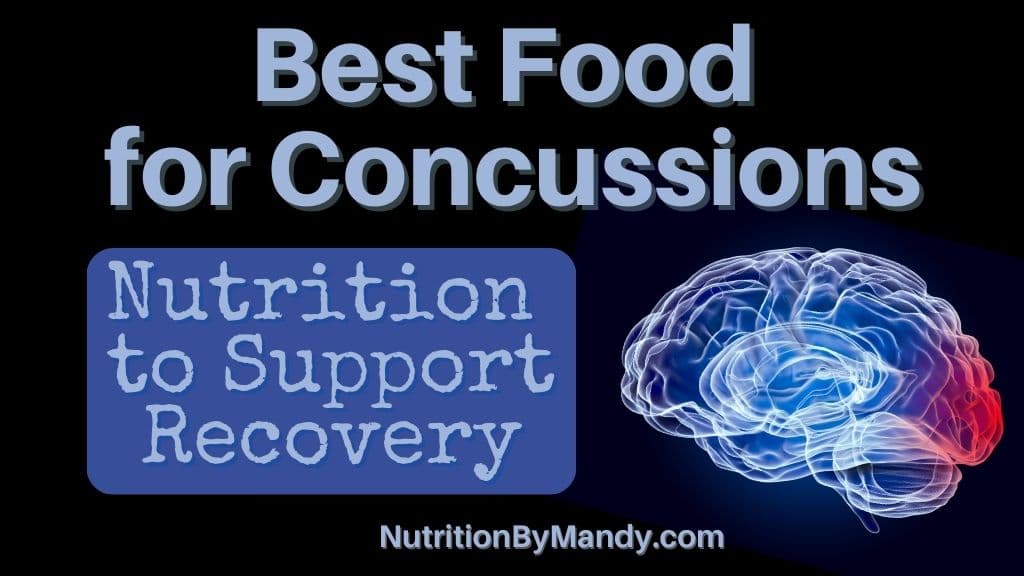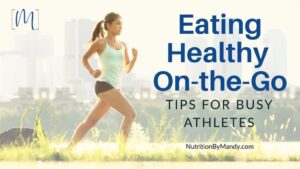Last Updated on April 24, 2025 by Mandy Tyler, M.Ed., RD, CSSD, LD
Best Food for Concussions: Nutrition to Support Recovery
Following a concussion, athletes often question what foods they should eat to support their recovery. While there is no one superfood, having a well-balanced sports nutrition meal plan can be a positive factor in an athlete’s recovery from a concussion.
Let’s take a look at what a concussion is. Then we will explore foods rich in key nutrients that support brain health and can be included in an athlete’s recovery nutrition diet.
What is a Concussion?
According to the National Athletic Trainers Association, a concussion is “trauma-induced alteration in mental status that may or may not involve loss of consciousness (1).”
Concussions may result from a blow or bump to the head or body. The blow can cause the brain to bounce or move within the skull. This jarring of the head can result in chemical changes within the brain and damage to brain cells (2).

Seek Medical Guidance for Concussions
It is critical for athletes to consult with their physician and athletic trainer following a concussion. Each athlete and concussion is unique. Thus, it is important for athletes to have an individualized recovery plan based upon their specific situation (3).
Best Food for Concussions
When an athlete sustains a concussion there is an increased need for energy and nutrients to support the brain through the recovery process (4). Therefore, providing athletes with guidance on foods to eat to support brain health and recovery can be of help.
This blog is intended to provide an overview of foods that are rich in nutrients that have been researched to support brain health following a concussion. Athletes should consult with their physician, athletic trainer, and a sports dietitian nutritionist on a plan specific to their needs.
In addition, athletes should only take dietary supplements under the guidance of their sports medicine team. Excess doses of some nutrients may hinder the recovery process (4).

Omega-3 Fatty Acids: Food for Concussions
Omega-3 fatty acids play an important role in supporting optimal brain health. The body cannot make omega-3 fatty acids. Thus, individuals must consume omega-3 fatty acids in the diet to support their health and nutrition needs (5).
Approximately 60% of the brain is made up of fatty acids (6). The omega-3 fatty acid, docosahexaenoic acid (DHA), is the predominant omega-3 fatty acid in the brain (7). It is necessary for brain development and repair as well as optimal cognitive functioning (4).
Consuming foods high in omega-3 fatty acids may provide neuroprotection and help support an athlete’s recovery following a concussion (4, 8).
Dietary Sources of Omega-3 Fatty Acids
Fish and seafood are the best dietary sources of omega-3 fatty acids. Cold-water fatty fish, in particular, are rich in omega-3 fatty acids.
This includes fish such as (5):
- Salmon
- Tuna
- Mackerel
- Herring
- Sardines
Following a concussion, adding fish to an athlete’s meal plan can help boost the omega-3 content of their diet.

Protein-Rich Food for Concussions
Consuming adequate protein following a concussion is important for athletes. Protein plays a critical role in supporting tissue healing and repair following an injury (4).
When a concussion occurs, there is an increased demand for protein. If athletes do not consume sufficient protein in the diet to support their recovery nutrition needs, the body will breakdown muscle stores to meet this demand (4).
Although athletes may not feel like eating following a concussion, ensuring adequate protein and calorie intake is critical to support the recovery process.
Ideas for Protein-Rich Foods to Consume Following a Concussion
Sources of protein to include in an athlete’s meal plan following a concussion include:
- Greek yogurt
- High-protein milk
- Cottage cheese, low-fat cheese, string cheese
- Chicken, turkey, seafood, pork, lean cuts of red meat
- Eggs, hard-boiled eggs
- Beans and legumes
- Nuts and nut butters
- Soy milk, tofu, edamame
Athletes following a vegetarian or vegan diet can meet their protein needs through food sources, such as beans, legumes, soy, and tofu.
However, careful planning of plant-based meals is important to ensure athletes consume adequate protein and essential nutrients to support their recovery nutrition needs.

Creatine-Rich Food for Concussions
In addition to protein, creatine has been researched for providing a potential positive benefit following a concussion (8).
Creatine is a naturally occurring compound in the body. The majority of creatine (95%) is stored in muscle, but it is also found in other tissues such as the heart and brain (9).
Following a concussion or brain injury, the content of creatine in the brain decreases (10). Thus, consuming foods that provide a good source of creatine may be of benefit to the athlete.
Foods Containing Creatine to Support Recovery from a Concussion
Given that creatine is predominantly found in muscle tissue, animal proteins are the best natural sources of creatine in the diet (11).
Foods providing creatine that athletes can add to their meal plan include:
- Lean red meat
- Chicken
- Turkey
- Seafood and fish
- Pork
Dairy products, such as milk, yogurt, and some cheeses also provide creatine, but in a lesser amount than animal proteins (11).
For athletes that consume animal products, including lean sources of these proteins in their recovery nutrition meal plan may be of benefit.
Magnesium-Rich Food for Concussions
Magnesium is a mineral that has many important roles in the body. It is necessary for energy production and serves as a cofactor for enzymatic reactions that control muscle and nerve function. Magnesium is also involved in protein, DNA, and RNA synthesis (12).
Following a concussion, levels of magnesium in the brain drop. The decreased levels of magnesium in the brain may impair the function of brain cells (4).
Thus, encouraging the consumption of magnesium-rich foods may help promote recovery following a concussion (4).
Foods Rich in Magnesium to Consume Following a Concussion
Magnesium-rich foods that athletes can consume in their diet following a concussion include (12).
- Green leafy vegetables
- Whole grains
- Nuts
- Seeds
- Beans and legumes
- Fortified breakfast cereals
Foods that are high in fiber often tend to be a good source of magnesium (12). These foods also provide vitamins, minerals, and antioxidants, which can support the overall health and nutrition needs of the athlete.
Anti-Inflammatory Food for Concussions
Following a concussion, the brain has an increased need for anti-inflammatory and anti-oxidant compounds (4). Thus, consuming a variety of anti-inflammatory foods in the diet is advantageous.
A well-planned recovery nutrition diet should include a variety of fruits, vegetables, nuts, seeds, fatty fish, herbs, and spices that can help reduce inflammation in the body and enhance recovery.

Berries: Anti-Inflammatory Fruit for Concussions
Consuming a wide variety of berries following a concussion can be a beneficial anti-inflammatory fruit choice for athletes.
Berries contain vitamins, minerals, phytochemicals, and fiber. They are recognized as being one of the best dietary sources of bioactive compounds, which have antioxidant and anti-inflammatory effects in the body (13).
Consider including a variety of berries in the athlete’s meal plan, such as:
- Blueberries
- Blackberries
- Raspberries
- Strawberries
- Cranberries
- Acai berries
- Goji berries
Cherries
Cherries are another nutrient-dense fruit choice for athletes. They provide Vitamin C, potassium, calcium, iron, and magnesium.
Cherries also contain phytochemicals and antioxidants, which have anti-inflammatory effects in the body (14).
Leafy Greens
Dark green leafy vegetables, such as spinach, kale, arugula, romaine lettuce, and Swiss chard, are excellent sources of many vitamins, minerals, phytochemicals, and antioxidants (15).
They provide the body with Vitamins A, C, E, and K, iron, potassium, and magnesium, as well as fiber.
Herbs and Spices
Herbs and spices not only add flavor to meals, but many also provide anti-inflammatory and antioxidant benefits. Athletes can consider adding spices such as garlic, ginger, turmeric, and rosemary to their meals.
Curcumin, one of the main components of the spice turmeric (16), in particular has been researched for potential benefits both pre- and post-concussion. More research is needed on the use of curcumin before recommending a therapeutic dose as a supplement (8).
However, athletes could consider the use of the spice turmeric (ingredient in curry powder) in meal preparation and recipes following a concussion.
Hydration Following a Concussion
Finally, it is important to note that in addition to food, encouraging athletes to hydrate following a concussion is important. Water is essential for supporting brain health and optimal function (17).
Athletes should be reminded to consume fluids throughout the day to stay on top of their hydration needs.
Reduced Appetite Following a Concussion
Following a concussion, an athlete’s energy and nutrient needs are high. Unfortunately, many athletes also experience a reduced appetite at this time (4).
Finding ways to add nutrient-dense foods to an athlete’s diet following a concussion may be of help. Eating small meals and balanced snacks frequently throughout the day can support athletes with meeting their energy and nutrient needs.

Planning Healthy Snacks Following a Concussion
Athletes should be encouraged to add well-balanced snacks to their recovery nutrition meal plan. Focus on building snacks that provide a good source of protein along with whole grains, fruits, vegetables, or healthy fats.
Healthy snack ideas include:
- Tuna fish with crackers
- Greek yogurt with berries and granola
- Hard-boiled eggs with grapes and walnuts
- Nut butter with apple slices
- Cottage cheese with pineapple and chia seeds
- Grilled chicken, spinach, avocado wrap
- Hummus with whole grain pita chips and mini peppers
Pro Tip: A fruit smoothie can be a convenient snack option that supports athletes with meeting their nutrient needs following a concussion. By preparing the smoothie with Greek yogurt, high-protein milk, berries, leafy greens, as well as chia seeds, the athlete will have a high-protein drink packed full of anti-inflammatory nutrients.
Best Food for Concussions: Nutrition to Support Recovery
You are now set with ideas for the best foods for athletes to eat following a concussion to support recovery.
Keep in mind, there is no one superfood. The foods listed above should be provided as part of a well-balanced sports nutrition meal plan coordinated with your sports medicine team.
For additional sports nutrition recommendations, check out my blog on nutrition tips for teen athletes.
Join the Nutrition By Mandy Email List & Get a Free Athlete’s Grocery List
Click HERE to join the Nutrition By Mandy e-mail list. When you join you will receive a free athlete’s grocery list to print and take with you to the store.
About the Author
Mandy Tyler is a Sports Dietitian Nutritionist in the San Antonio, TX area. She is a Registered and Licensed Dietitian, a Board-Certified Specialist in Sports Dietetics, a Licensed Athletic Trainer, and is a Certified Exercise Physiologist through the American College of Sports Medicine. Mandy has experience working with athletes at the high school, collegiate, and professional levels. She believes the key to reaching one’s full potential, both in everyday life and in sports performance, relies on a healthy nutritional foundation.

If you are looking to take your performance to the next level, make sure to check out my new Sports Nutrition Game Day Guide. This downloadable guide is written to help athletes develop an individualized plan to achieve peak performance on game day.





